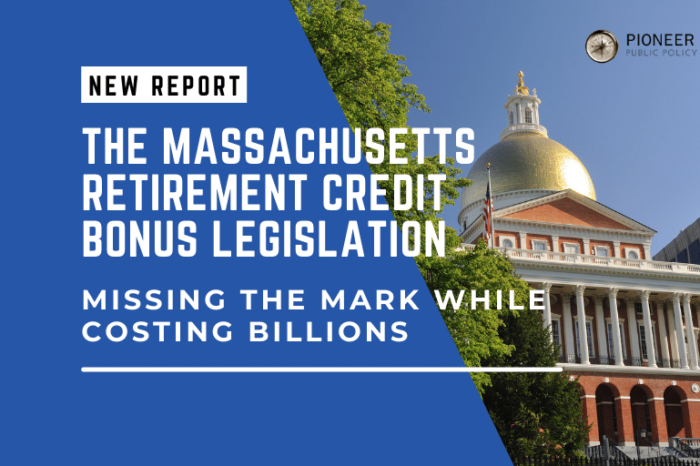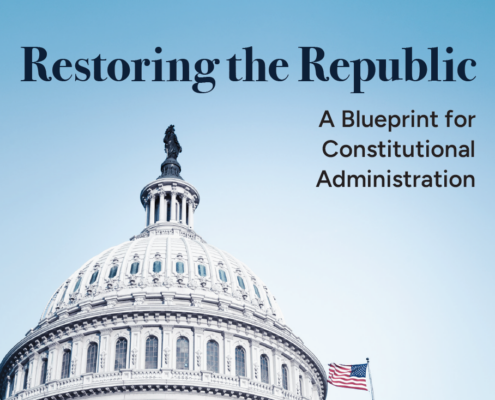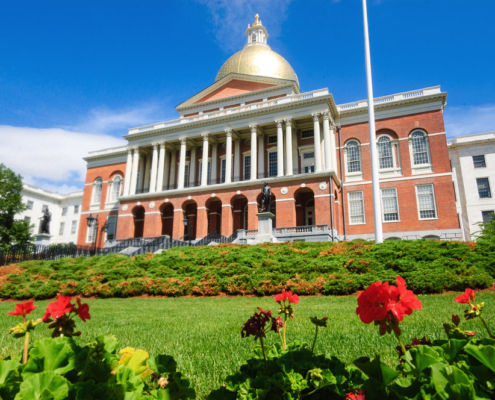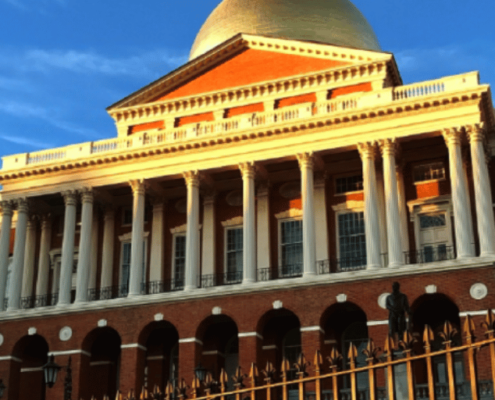Study: Pandemic Pension Bonus Bills Would Cost Billions and Unfairly Favor Highly Compensated Public Employees
Read coverage of this report in the Boston Herald.
Massachusetts’ Proposal Far More Generous than Other States’ COVID Bonuses
BOSTON – Two identical bills to reward public employees with a retirement credit bonus for working during the COVID-19 emergency are currently pending in each chamber of the Massachusetts Legislature. The bills would add billions of dollars in liabilities to public pension funds and reward workers based on their compensation, years of service and age rather than the type or duration of the work performed during the emergency, according to a new study published by Pioneer Institute.
“It would be fine for the legislature to reward public employees who faced pandemic-related risks,” said Pioneer Institute Executive Director Jim Stergios.” “But with Beacon Hill awash in billions of federal dollars, these bills unfortunately smack of a money grab.”
The bills (H. 2808 and S. 1669) would add three years to eligible employees’ age or years of creditable service for the purpose of calculating pension benefits for any Massachusetts public employee who was required to or volunteered to work outside their homes between March 10th and December 31st of 2020.
The legislation would add up to $1.73 billion in pension liabilities to the State Employee Retirement System. But total costs would likely be many times higher, since SERS is just one of over 100 public employee pension systems in Massachusetts.
The potential hit comes at a time when many of the Commonwealth’s public pension systems are in a precarious position. The average public pension system in the U.S. was 75 percent funded in 2020, but SERS was 67 percent funded at the beginning of this year and the Massachusetts State Teachers’ Retirement System had a 52 percent funded ratio in 2019. Many local systems are faring even worse; the Springfield Retirement System had a 29 percent funded ratio at the beginning of last year.
“The Public Employee Retirement and Administration Commission and local government retirement boards should conduct full actuarial valuations of the impact of the credit bonus on pension costs,” said James Bohn, author of The Massachusetts Retirement Credit Bonus Legislation: Missing the Mark While Costing Billions. “The valuations should also address the amounts of additional pension contributions that would be needed to fund this legislation and they should be completed before legislators act on the bills.”
Three examples of hypothetical public employees, each of whom is 47 years old with 12 years of creditable service and will retire at 62 (all based on public employee averages) demonstrate how the legislation would reward employees based much more on their compensation, age and years of service than on the duration or type of work they performed during the COVID emergency.
A nursing assistant at the Holyoke Soldiers’ Home earning the $54,851 average annual salary for her position would see a $40,431 increase in pension wealth under the bills.
A state legislator earning $85,000 would see a $62,655 bump in pension wealth, despite having far less exposure to COVID at work than the Holyoke Soldiers’ Home nurse.
A senior public college or university administrator earning $200,000 per year would see her pension wealth increase by $147,424, even though her work caused less exposure to the virus than either the nursing assistant or the legislator.
Bohn found that the average state employee, with an annual salary of $75,108, would see his pension wealth grow by $55,364, or 74 percent of his 2021 earnings, for work performed over an approximately nine-month period.
State and local governments in at least 35 states have instituted hazard pay arrangements. Of the arrangements surveyed, the largest one-time cash bonus was $5,000, and the largest hourly pay hike was $10 per hour.
Workers in state hospitals, mental health facilities, group homes and social workers who were members of AFSCME Local 93 received temporary $5-to-$10 per hour pay increases during the pandemic. Those who didn’t miss a shift received an additional $500 bonus.
Full-time officers who are members of the Massachusetts Correction Officers Federated Union who weren’t given the option of working remotely or on a hybrid schedule between November 2, 2020 and May 29, 2021 have received $2,000 bonuses. The pending legislation would make bonuses 28 times larger than what was given to corrections officers widely available to public employees.
The bills’ broad and vague eligibility standards present additional problems. It appears that public employees need not even have worked outside the home as long as they volunteered to do so during the pandemic. In March of last year, many personnel administrators likely didn’t foresee any reasons to record offers of service, and the abrupt shift to remote work made it difficult for managers to monitor and verify where employees performed their duties. Such vague standards increase the likelihood of fraud or abuse and would increase administrative and litigation costs.
About the Author
James Bohn is an economist with more than 25 years of experience in government, business, and academics. He was formerly an Assistant Vice President and Senior Professional at the Federal Reserve Bank of Boston. He holds a Ph.D. in Business Economics from Harvard University, is a CFA charter holder and is a Certified Fraud Examiner.
Pioneer’s mission is to develop and communicate dynamic ideas that advance prosperity and a vibrant civic life in Massachusetts and beyond. Pioneer’s vision of success is a state and nation where our people can prosper and our society thrive because we enjoy world-class options in education, healthcare, transportation and economic opportunity, and where our government is limited, accountable and transparent. Pioneer values an America where our citizenry is well-educated and willing to test our beliefs based on facts and the free exchange of ideas, and committed to liberty, personal responsibility, and free enterprise.
Stop the Blanket Pension Giveaway
Related Posts











